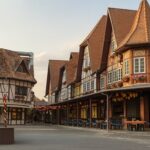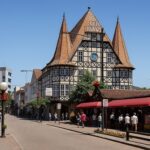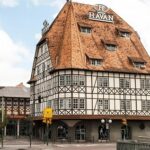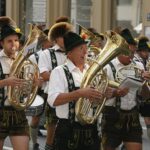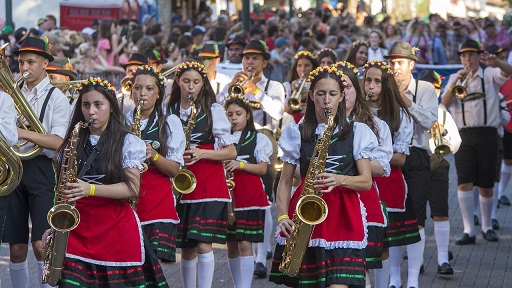
When most people think of Oktoberfest, their minds jump to Munich – massive beer tents, cheerful brass bands, and Lederhosen-clad revelers. But the world’s second-largest Oktoberfest isn’t in Germany. It’s in Blumenau, Brazil – a city deep in the southern state of Santa Catarina, where German heritage runs so deep it echoes in every bratwurst, polka, and stein.
Blumenau’s Oktoberfest is more than just a party. It’s a full-blown cultural celebration, a reclaiming of tradition, and a powerful reminder of how German immigrants shaped one of Brazil’s most vibrant regions. Each year, hundreds of thousands of visitors flock to this city of 350,000 to join in a Bavarian carnival set in the tropics – complete with oompah bands, costume parades, folk dancing, and yes, rivers of beer.
This guide explores the roots, rituals, and remarkable size of Blumenau’s Oktoberfest – and why it’s become a must-see event for culture lovers, beer fans, and curious travelers alike.
➡️ Related: Founding of Blumenau: German Roots in Brazil
A Celebration Born from Disaster
Blumenau’s Oktoberfest was first held in 1984, and it wasn’t originally designed just for fun. That year, the city was devastated by a historic flood of the Itajaí-Açu River. Seeking a way to raise community morale and promote tourism, city leaders proposed a local version of Munich’s Oktoberfest – a nod to Blumenau’s strong German identity.
The response was overwhelming. Over 100,000 visitors attended the first festival, and its success quickly transformed Oktoberfest into an annual institution. Today, it attracts more than 700,000 people each year over 18 days, rivaling global events in scale and spirit.
Where It Happens: Parque Vila Germânica
The epicenter of Blumenau’s Oktoberfest is Parque Vila Germânica, a charming Bavarian-style village complex designed to host major cultural events. The park is home to:
- Multiple themed beer halls
- Outdoor markets with crafts and food
- The main parade route
- Exhibition halls for traditional competitions
- Stages for concerts and folk performances
Each beer hall – like Biergarten, Spaten, Eisenbahn, and Bier Vila – is themed and decorated to immerse visitors in a different facet of German beer culture. Expect wooden benches, long communal tables, decorative hops, and waiters in Dirndls and Lederhosen.
➡️ Related: German Architecture in Blumenau: Fachwerk Houses in the Tropics
The Music: Brass Bands and Polka Energy
Music is the heartbeat of Oktoberfest, and in Blumenau it’s no different. Every night, traditional German oompah bands – many flown in from Germany or southern Brazil – perform high-energy sets of folk, polka, and danceable hits.
From classics like “Ein Prosit” to Brazilian-inflected polka, the soundscape is irresistibly cheerful. It’s not uncommon to see strangers linking arms and dancing between tables, their beer mugs clinking in celebration.
Special performances include:
- Schuhplattler dancing troupes
- Alpenhorn demonstrations
- Folk music ensembles in regional costume
The Costumes: Dirndls, Lederhosen, and Blumenmädchen
Costume is not optional at Blumenau’s Oktoberfest – it’s a statement of cultural pride. Many attendees come dressed in:
- Dirndls (for women) – bright, ribboned, and laced dresses
- Lederhosen (for men) – suede shorts with suspenders
But local variations add a twist. Expect tropical fabrics, flower crowns, and uniquely Brazilian color palettes.
Each year, the festival crowns its own royalty:
- Queen of Oktoberfest (Rainha)
- Two Princesses (Princesas)
These ambassadors represent Blumenau in cultural events across Brazil and even in Germany.
What to Eat: German Cuisine with a Brazilian Flair
Food at Oktoberfest Blumenau is a delicious hybrid of traditional German dishes and Brazilian interpretations. Popular choices include:
- Bratwurst and Currywurst
- Eisbein (pork knuckle)
- Sauerkraut, potato salad, and Apfelstrudel
- Brazilian specialties like pastel and cassava fries with German toppings
For dessert, don’t miss Kuchen, apple cake, or regional sweets like Schneeball.
Vegetarian options have increased in recent years to accommodate diverse visitors, while local breweries offer craft beer pairings for every dish.
The Beer: From Steins to Meters
Beer is, of course, the star of the show. Blumenau’s Oktoberfest partners with both international and local breweries. You’ll find German classics like:
- Spaten
- Erdinger
- Warsteiner
And award-winning Brazilian brands such as:
- Eisenbahn (based in Blumenau)
- Bierland
- Schornstein
The drinking rituals are part of the fun:
- Chopp em Metro (beer drinking by the meter)
- Communal toasts every 30 minutes
- Beer queen challenges and brewery games
➡️ Learn more: Food, Language, and Customs: Everyday German Life in Blumenau
Daily Highlights and Schedule
The 18-day festival is packed with scheduled events:
- Opening Parade (Rua XV de Novembro): features costumed bands, dancers, floats, and cultural groups
- Folk Competitions: including traditional dances and beer stein carrying
- Cultural Evenings: each night has a theme – Bavarian night, German-Brazilian integration night, etc.
- Children’s Day and family programming
- Costume Contests and live music tournaments
The best nights to visit? Thursdays to Saturdays, when crowds are lively, bands are international, and the tents are full of festive energy.
Visitor Tips and Travel Logistics
- Tickets: Available online or at the gate. Weekdays are cheaper; weekends are busiest.
- Costumes: Renting is popular and affordable in local shops.
- Lodging: Hotels fill fast. Book early or consider staying in nearby cities like Gaspar or Pomerode.
- Transport: Shuttle buses run from nearby airports and hotels.
- Safety: The festival is family-friendly, well-organized, and policed with German efficiency.
Oktoberfest as Cultural Revival
While Oktoberfest is undeniably fun, it also plays a deeper role. After decades of suppression during the world wars, Blumenau’s German identity has re-emerged through the festival. What began as a recovery project became a cultural revival – a way for young Brazilians of German descent to reconnect with their roots.
Many performers, organizers, and attendees see Oktoberfest not as an imported event but as a local tradition passed down through generations. It represents joy, memory, and pride.
➡️ Explore the origin: Blumenau: A German Town in Brazil – Culture, History, and Identity
A Tropical Tribute to German Tradition
Blumenau’s Oktoberfest is more than beer and bratwurst – it’s a colorful, deeply felt celebration of identity. Here, in the humid warmth of southern Brazil, you’ll find a festival that honors its European origins while thriving with local color and spirit.
Whether you’re a first-timer or a returning reveler, Oktoberfest in Blumenau offers something rare: a chance to toast tradition, community, and cross-continental culture – all in one frothy, foot-stomping, and unforgettable celebration.
➡️ Continue the series:
